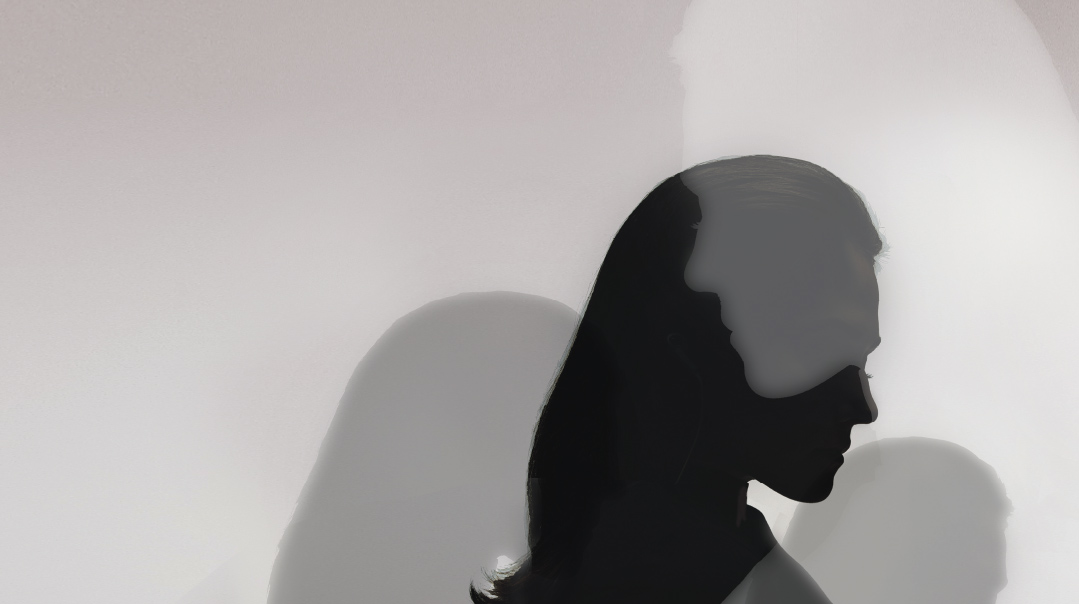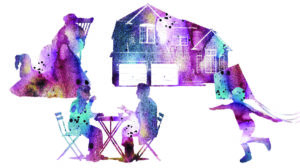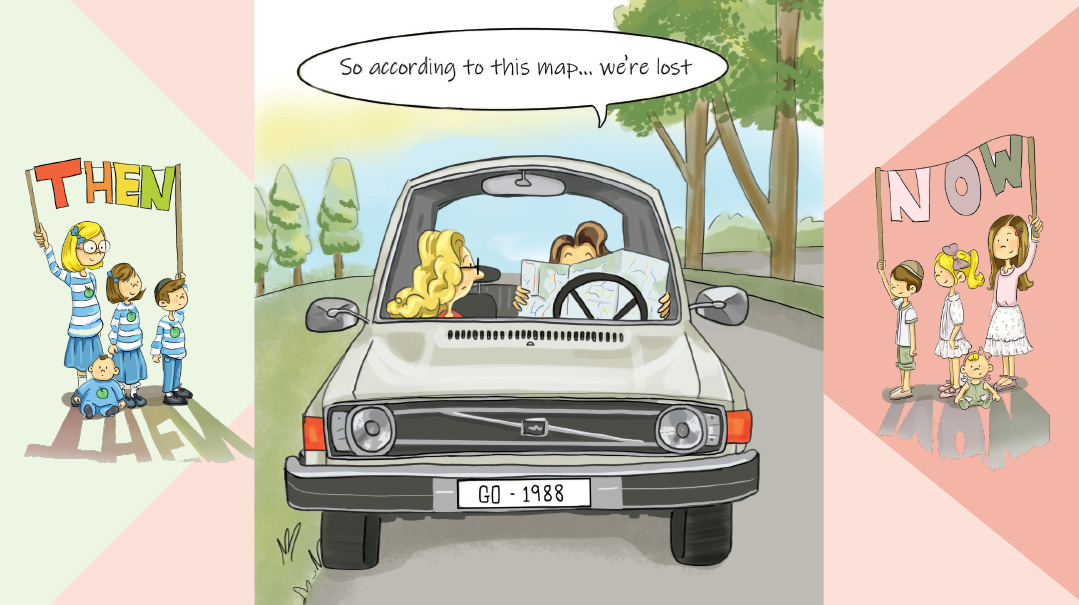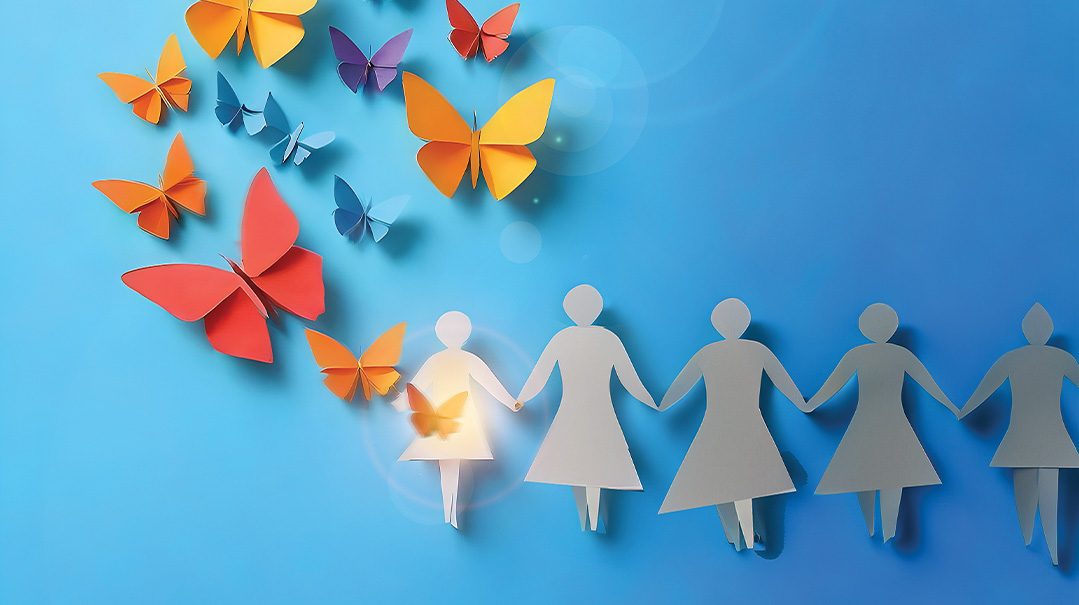Gray Matters

It’s tempting to bypass the distressing feelings and skip straight to declarations of emunah. But if we don’t acknowledge them, those difficult emotions fester. True emunah requires facing pain and ambivalence, owning them, and only then transcending them

Some stories bear repeating. This is one of them. Close to 20 years ago my family made the difficult and painful decision to relocate my sister Ahuva, who has Down syndrome, to an assisted-living HASC home in Brooklyn. This meant sending her hundreds of miles away without the reassurance of steady visits to see how she was acclimating.
The decision was torturous, the goodbye heartbreaking. We settled her into the competent care of the staff, took our leave, and returned home, willing our hearts to catch up with our minds, which knew this was the right decision.
A few days later, I called her to see how she was doing. Babbling as I do when I feel guilty and scared, I blurted out, “So, Ahuva, do you like New York or do you miss home?”
And Ahuva, in her simplicity and depth, taught me more than six years’ worth of training had, with one single word: “Both,” she said.
Both. She felt both. She liked New York and she missed home.
I held on to that word and that lesson for a long time (18 years and counting). It’s possible to feel two conflicting emotions at the same time. It’s possible, and even probable, to hold two paradoxical thoughts at once. The recognition of that truth has proven to be a ticket to living a richer, fuller, more authentic life.
Living with Ambivalence
This fusion of black and white doesn’t come easy for many. Black-white, wrong-right, love-hate — such distinctions are so clear. It’s simple: If I’m one, I’m not the other. If you’re one, you’re not the other. It’s so easy to categorize and then respond accordingly.
If you love New York, I can relieve myself of the guilt burden I’ve been carrying since Sunday when we dropped you off. If you miss home, I can let loose an avalanche of self-flagellation and regret. But if you feel both, I must create a space in my heart big enough and different enough to hold both emotions at the same time.
Ambivalence is more than the sum of two emotions. Gray is a new color, a new shade of reality, different than black and white lined up side by side.
“Ein ba’olam simchah k’hataras hasfeikos — There’s no joy in the world like the resolution of doubt” (Metzudas Dovid, Mishlei 15:30). Not knowing is painful. And exceedingly useful and helpful. The capacity to tolerate ambivalence is among the most transcendent functions we possess as humans.
We crave clarity like a physical hunger. Observe the girl after a fourth date who doesn’t know whether to continue, the mother who doesn’t know whether to mainstream her child or place him in a special class, the husband who has to decide between a steady job and a potentially lucrative but risky business venture. They share a common angst. They’re tortured. They’re desperate for an answer. Tell me yes or tell me no.
The space between that pain and their answer is the ground for growth. Weighing the options brings to light their deepest values. Choosing highlights their priorities. It’s a process of self-reflection and self-growth that raises an individual to the next level of consciousness. Woe to the person who can’t hold that pain and must run from it at any cost. What a lost opportunity to truly know themselves and others.
A prime example of fertile ground for developing this space is the saga of shidduchim. We know making shidduchim is kasheh k’Kri’as Yam Suf, and for parents going through the parshah, this is an apt metaphor. We’ve experienced, both individually and as a generation, that terrifying sensation of feeling like we’re going to drown, and the liberation that comes from knowing the yeshuah can only come from Hashem.
There are times we feel we can’t do this another day, that we’re going to drown in angst if Hashem doesn’t send help now. What we need to understand is that appreciating the sole Source of yeshuah and the incomparable relief of surrendering ourselves to Hashem is directly proportional to the feelings of despair and helplessness that precede it.
Travel Through Feelings
For the fortunate few, life is filled with the clarity that only unmitigated emunah can provide. They’ve worked on themselves so deeply that they can access clarity instantaneously.
But for the rest of us, life is the process of trying to get to that place. Part of owning that process and achieving authentic emunah is accepting the full range of feelings that comes before that closure.
Being the maamanim that we are, we often feel guilty about our feelings. We believe a true maamin bypasses human emotion and goes straight to emunah and bitachon. How can I wonder whether my child will ever find her bashert? What kind of kofer am I?!
How can I be angry that we’re good, yashrusdig people who can’t seem to marry off our children, when people with questionable reputations seem to have no trouble? I need to eradicate this anger.
How can I be jealous of my neighbor’s daughter, who is three years younger than my daughter and just got engaged? What kind of horrible person am I? I should be thrilled for her and trust that everything is exactly as it should be.
Yes. But not yet.
Observe the following.
Exhibit A:
Shani and Yanki are about to celebrate their second anniversary, except they aren’t, because Yanki completely forgot about it. Shani has been flitting nervously about the house, not wanting to ruin the surprise she’s sure Yanki has planned for an occasion of this magnitude.
As the day progresses and signs of imminent celebration seems less and less likely, her anticipation reaches epic proportions.
“This man’s a genius,” she reasons, “throwing me off course by making me think he forgot. I can’t wait to see the surprise he has planned for this evening.”
Alas, Shani is surprised, but not in the way she expected. Dinner gives way to night seder and Maariv, with nary a mention of the big day. Shani is devastated and furious.
As she ranges through that terrain of feelings, a voice in the back of her head whispers with increasing urgency, “Be dan l’kaf zechus. Eishes chayil. Eizu hu ishah k’sheirah. A woman is responsible for the tone in her home.” The voice is a conglomeration of many voices over the years, and it’s one that gives Shani pause. She washes her face, reapplies some mascara, and welcomes Yanki with a big smile when he returns home.
Yanki takes a look at his wife, who is at once a stranger and an intimate friend, and wonders aloud, “Are you okay?” to which Shani replies in her bravest (if still quivering) voice, “Sure! How was night seder?”
Yanki remains unconvinced but decides to take her word for it until the next day, when his mother calls to wish him a belated happy anniversary. (Note to mothers: If you’re going to acknowledge anniversaries, it’s way more helpful the day before than the day after.)
Exhibit B:
Yanki and Shani are about to celebrate their third anniversary, except they aren’t, because Yanki has completely forgotten about it. Apparently he comes by this honestly, because his mother, who was supposed to call the day before, not after, forgot to call and remind him. Shani, who is sure Yanki would not hurt her again the way he did last year, remains cautiously optimistic that a celebration is imminent, although way less certainly than the year before. When the day proceeds in much the same way as the previous year, Shani decides to do it differently this time.
When Yanki comes home and looks at her tear-stained face and asks, “Is everything okay?” she says, “Everything is baruch Hashem okay, but I’m really upset.” She moves from mad to sad as she describes how foolish she felt, the sense of betrayal that he could hurt her again in this way, and the shame at feeling so unimportant that he could forget her.
And suddenly Yanki knows his wife like he’s never known her before. A vista of knowledge is opened before him. “Vayeida” — that knowledge leads to an emotional intimacy that this couple has never known. And yes, there was some anger, and some tears, but they were authentic and were used to build connection, not destroy. Their bond has intensified.
Exhibit C:
Yanki and Shani are about to celebrate their 25th anniversary, except they aren’t, because Yanki is taking their son for a farher and is visiting his parents at the same time.
Shani calls him to discuss the trip and as she’s about to hang up, playfully remarks, “Happy anniversary!” to which he responds, “You too! And best wishes from my mother.” They each hang up and smile, 25 years of connection between them.
In both the first and third scenario there are smiles and everything is good. But can you see how that second smile is a qualitatively different smile? The first is contrived, the second authentic. Twenty-two years of authentic sharing in between gave rise to the organic warmth of the 25-year smile.
The Emotional Bridge
We need not be afraid of hard feelings. They’re the bridge between lip service and authentic connection in our relationships with others — and in our relationship with Hashem.
Several weeks ago, Miriam Kosman wrote a stunning editorial in Mishpacha underscoring this very point (Issue 766, Perspective). She referenced Rav Izik Sher ztz”l in sefer Leket Sichos Mussar who explained that the tears pouring out of Avraham Avinu’s eyes as he was about to slaughter Yitzchak were the source of the greatness of the Akeidah.
Rav Sher explains that had this offering come at no emotional cost, it would’ve been meaningless. The struggle and the agony are what give value to our service. Giving $1,000 to tzedakah is a big deal when you earn $50,000 a year, less so when you earn $5 million.
But there’s more. We can’t access the connection if we don’t know what it is we need.
We can only seek comfort when we acknowledge we’re hurting. We can only ask for help when we acknowledge we’re missing something. And we can only set limits when we acknowledge we’re angry.
Several years back I was fortunate enough to be enrolled as a student in the Mastery Program given by Dina Friedman. One of the highlights was the lesson on the role of emotions. Dina taught us that emotions, like everything else in Hashem’s world, are here to serve us. They’re the internal cue that something in our world needs attention.
For example, anger lets us know that someone has crossed our boundaries or broken one of our rules. Going back to poor, uncelebrated Shani, we see that her anger came from the feeling that Yanki broke the “milestones must be celebrated” rule. Her eventual acknowledgment of that anger, among other emotions, opened the door for rich conversation about unspoken rules and the meanings we attach to them. They were a window into her inner world and a bridge connecting her to her husband.
Our emotions are here to stretch us and bring the deepest part of ourselves out so that we’re fully engaged in our lives. What a shame it is when our defenses are so afraid of that depth that they prevent us from going there.
Defenses are there to protect us from flooding and from overwhelming feelings, not from the normal (albeit painful) ones. To live a fully rich, healthy, and authentic life, we need the courage to face those defenses, thank them for their work, and then ask them to step aside so we can meet our true selves.
If we admit we’re jealous, we can seek to understand what we’re truly missing in our lives. And then we can get on with the work of filling that hole in a way that’s meaningful to our personal journey. This, more than any denial, will allow us to rise above our jealousy and into a place of serenity and acceptance.
In Practice
How can we apply this paradigm? How does it look in real time when applied to parents struggling with children in shidduchim?
We got a no last night. Okay, I guess it’s not bashert. Let’s move on.
Contrast that with “Ouch!” and a deep breath. “Help me, Hashem, this is so hard. She was so excited. We were so excited. We all thought this might be It. Is it ever going to happen?! What are we supposed to tell her?
“I guess we’ll tell her what we really know to be true. That You love her, even when it hurts. And that we’re so sorry she’s in pain. And that we know everything is bashert. Please help us feel that in the depths of our hearts, so that this too can bring us closer to You.”
Feel the difference in both of those experiences, and in how Hashem would react to our vulnerability and desire to be close.
There are so many feelings. Fear, anger, anxiety, jealousy. And so much guilt for having those feelings.
Parents struggle deeply with the guilt. What’s wrong with my emunah? We’re flooded with heroic stories of simple people, pashute Yidden, who display extraordinary faith in dire circumstances. And instinctively we compare ourselves to see if we measure up.
What we don’t know is the rest of the story. How did they get there? Did they stay there? Is it sometimes easier to access faith in dramatic moments than in the banal moments that make up life? Would we, too, be capable of displaying that same greatness under specific conditions? What history and personality do they bring to the table that contributes to their faith?
We don’t know the answers to those questions. We only see these heroes as compared to our “mediocre” selves.
And then the self-recrimination begins. I’m not enough. Why can’t I be more? We fail to understand that what Hashem wants from us is what we can give at that moment, from that place!
If we feel jealous, then we’re meant to work on jealousy. If we feel afraid, we’re meant to work on emunah. Nothing is an accident, including the nisyonos we receive. Real bitachon comes after the pain, the doubts, the anger, and the ultimate recognition that, yes! This is how it’s meant to be. This is an expression of Hashem’s love.
Rocking the Boat
So many people fear the work. Why rock the boat? What’s with all this newfangled psychobabble? They’re the first to proclaim loudly and insistently to their spouse, “Of course I’m not jealous that my parents financially support my brother but never give us anything — he needs it and I don’t.” They completely ignore a lifetime of feeling that the parents have always favored this younger brother, and that they’ve always been hurt by it.
They live life on the surface, unaware that ambivalence and feelings are steady employees who faithfully do their job with or without the consent of their employer. When we ignore them, we’re left with their impact, but not with awareness. Denial of real feelings, especially the ones we prefer to ignore, leaves us with passive-aggressive reactions, with somatic illness, with stilted relationships, with lingering resentment, and a host of other unintended consequences.
A wife who buries the resentment she feels at hosting many guests every Shabbos but feels like she must, to retain her Eishes Chayil title, may soon find herself dreading Shabbos. Or she may unwittingly disengage from the guests and her husband during the meal. Everyone does it their own way.
But it’s so much healthier, more authentic, and more connection-building to feel the feeling, have the conversation, and come to a healthy resolution. No one is saying she should give up the mitzvah, but exploring what it is about it that she resents changes everything. She may discover she feels taken for granted, in which case more gratitude from her husband will go a long way. She may feel Shabbos was her only chance to connect to her husband and children, and that loss may need to be compensated for in another way.
The feeling is there to alert her: something needs attention. Attention will be paid. You decide how. Will you heed the call now in a healthy way? Or will you wait until the feeling rears its angry, neglected head?
This knowledge confuses many people. What about the stories we read of gedolim? Or simple people with emunah peshutah whose gut reaction was one of shleimus? Isn’t that our goal?
Yes, there are those whose spontaneous reaction of “gam zu l’tovah” comes from a very deep place. These are the folks who have spent a lifetime feeling Hashem’s presence and accepting His will in every facet and nook of their lives. Their smile is the smile of Shani and Yanki who have been sharing for 25 years, so now all they need are codewords. Their “it’s bashert” is packed with meaning and feeling. It’s the “how arrrre you?!” of two friends who meet in Miami after not seeing each other for ten years, as opposed to the “how are you?” of the two women on the auction committee who meet at Evergreen.
Yes, this shorthand is a goal. But it has to represent long and hard work. It’s shorthand, not a shortcut.
All of which brings us full circle to the role of ambivalence. Experiencing life in a multidimensional way is not a contradiction to the singularity of purpose we strive for. We can hold both the ideals we articulate and the raw emotion we experience at the same time. And rise to one on the back of the other.
Both.
What Emotions Tell You
There are five primary emotions, each of which teaches us something about our inner and outer world:
Anger lets you know that:
- Someone has crossed your boundaries or broken one of your rules
- You’ve betrayed yourself by saying yes when you really want to say no, or vice versa
Fear is there to alert you to take precautionary action before an upcoming event. Once you’ve listened to the fear and taken appropriate action steps that are within your control, you can drop the emotion. Then employ the antidote, which is faith.
Guilt lets you know that you’ve violated one of your highest standards and that you must do something immediately to ensure that you’re not going to violate that standard in the future again.
Jealousy lets you know that you’ve been denying yourself something you truly want in your own life. It may not be the actual item you covet, but rather what it represents. For example, if you’re jealous that your friend goes out to dinner with her husband, you might be wishing you too could be pampered. You would then need to find ways to incorporate pampering into your life in a way that makes sense for you.
Sadness follows loss.
Adapted from the Mastery Series 1, 2016–2017, Dina Friedman Academy
(Originally featured in Family First, Issue 655)
Oops! We could not locate your form.













